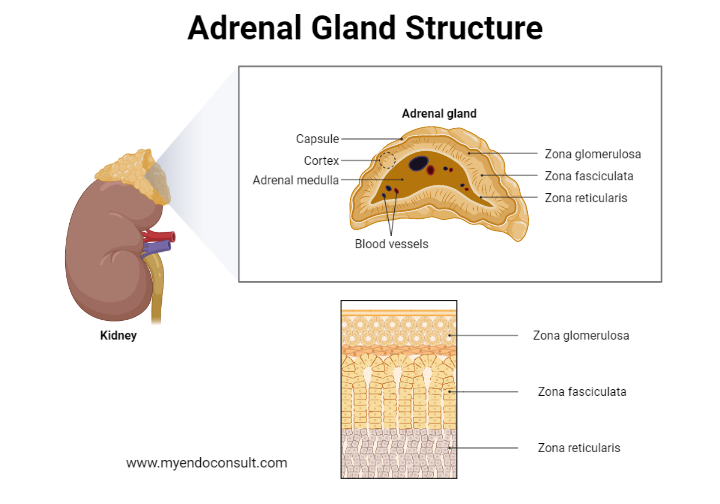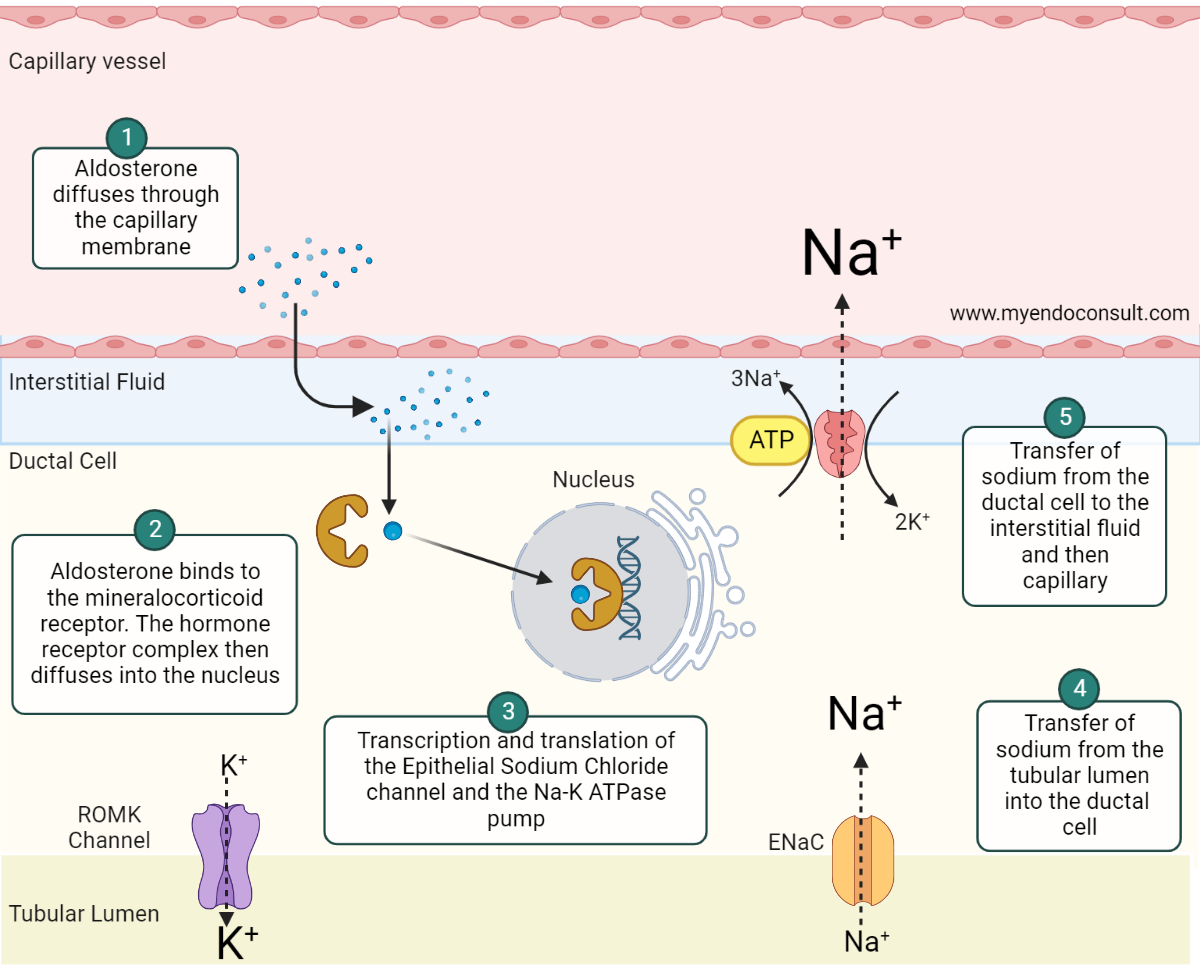The adrenal glands atop each kidney consist of two layers: the adrenal cortex and the adrenal medulla. The adrenal cortex is divided into three distinct zones: zona glomerulosa, zona fasciculata, and zona reticularis. Each zone produces different hormones, with the zona glomerulosa synthesizing mineralocorticoids, primarily aldosterone. This article delves into the anatomy and physiological effects of the zona glomerulosa of the adrenal gland.
Anatomy of the Zona Glomerulosa
The zona glomerulosa, the outermost layer of the adrenal cortex, comprises densely packed cell clusters. These cells are responsible for producing and secreting mineralocorticoids, particularly aldosterone. Aldosterone production is tightly regulated by the renin-angiotensin-aldosterone system (RAAS) in response to variations in blood pressure, blood volume, and electrolyte balance.

Layers of the adrenal gland
Physiological Effects of Aldosterone
Aldosterone, the primary mineralocorticoid in humans, has significant physiological effects on various organs, including the kidneys, intestines, eccrine sweat glands, and salivary glands.
Aldosterone stimulates the reabsorption of sodium ions from the tubular fluid in the distal convoluted tubule and cortical collecting duct. This process involves the regulation of apical membrane sodium channels and the basolateral Na+-K+-ATPase. Aldosterone also promotes potassium secretion, resulting in the excretion of potassium ions in the urine, and H+ excretion, contributing to the regulation of the body's acid-base balance.
In the colon, aldosterone stimulates the Na+/H+ exchange transporter, increasing the absorption of Na+ (and Cl−) ions across the cells and into the general circulation, in exchange for H+ (and HCO3−) ions. This process contributes to maintaining electrolyte balance in the body.
Aldosterone indirectly regulates extracellular fluid volume (ECFV) through its effect on plasma sodium concentration. The increased plasma sodium stimulates central osmoreceptors, leading to increased vasopressin release from the neurohypophysis. Vasopressin, in turn, stimulates distal tubular water reabsorption, increasing ECFV under normal conditions, which is crucial for maintaining arterial blood pressure. Consequently, imbalances in mineralocorticoid activity may result in hypertension or hypotension.
Chronic elevation of aldosterone production leads to the expansion of ECFV, limited to a maximum of 15% due to compensatory mechanisms. These mechanisms include increased release of atrial natriuretic peptide (ANP) from the heart's left atrium, which induces renal natriuresis to counterbalance the effects of aldosterone. This is conventionally accepted as the aldosterone escape phenomenon.
Mineralocorticoids: Overview and Types
Mineralocorticoids are a class of steroid hormones primarily produced in the zona glomerulosa of the adrenal cortex. They play a crucial role in maintaining electrolyte balance, blood volume, and blood pressure in the body. Aldosterone is the principal mineralocorticoid in humans, while corticosterone serves as the main mineralocorticoid in rodents. Deoxycorticosterone (DOC) is another mineralocorticoid with weaker activity than aldosterone.
Mechanism of Action of Mineralocorticoids
Mineralocorticoids, such as aldosterone, exert their physiological effects by binding to the mineralocorticoid receptor (MR) in target cells. The MR is a ligand-activated transcription factor belonging to the nuclear receptor superfamily.

The mechanism of action of aldosterone
The mechanism of action of mineralocorticoids involves a series of steps. As you may recall, mineralocorticoids are lipid-soluble hormones that can easily diffuse across the plasma membrane of target cells. Once inside the target cell, mineralocorticoids bind to the MR in the cytoplasm, forming a hormone-receptor complex.
The hormone-receptor complex then translocates to the nucleus, where it binds to specific DNA sequences called hormone response elements (HREs) on the promoter region of target genes.
Binding to HREs activates or represses the transcription of target genes, leading to the synthesis of specific proteins mediating mineralocorticoids' physiological effects. The newly synthesized proteins regulate various cellular processes, such as ion transport, enzyme activity, and electrolyte balance, leading to the physiological effects of mineralocorticoids.
For example, in the kidneys, aldosterone binds to MR in the cells of the distal convoluted tubule and cortical collecting duct. This binding triggers the transcription of genes that encode sodium and potassium ion transport proteins, such as the epithelial sodium channel (ENaC) and the Na+-K+-ATPase.
In the intestines, aldosterone stimulates the synthesis of sodium and chloride absorption proteins, such as the Na+/H+ exchanger and the Cl−/HCO3− exchanger.
Pharmacological Implications
Given the importance of mineralocorticoids in maintaining electrolyte balance, blood volume, and blood pressure, they are a focus in the treatment of various clinical conditions. For example, mineralocorticoid receptor antagonists (MRAs), such as spironolactone and eplerenone, are used in treating primary aldosteronism, heart failure, and resistant hypertension. These drugs block the binding of aldosterone to MR, thereby inhibiting its physiological effects.
Conversely, synthetic mineralocorticoids, such as fludrocortisone, are used in the treatment of conditions like adrenal insufficiency (Addison's disease), where patients have low levels of endogenous mineralocorticoids.
In conclusion, mineralocorticoids play a crucial role in maintaining electrolyte balance, blood volume, and blood pressure. Their mechanism of action involves binding to the mineralocorticoid receptor, leading to gene transcription and the synthesis of proteins that mediate their physiological effects. Understanding the intricacies of mineralocorticoid action is essential for developing targeted therapies for various clinical conditions.
Kindly Let Us Know If This Was helpful? Thank You!


